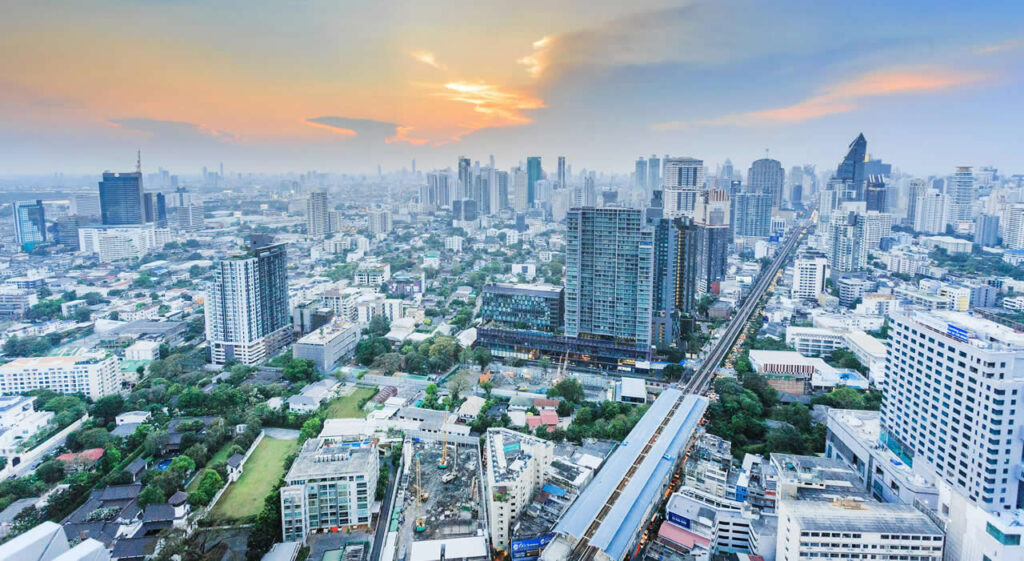Table of Contents
- Teaching English
- Corporate & Skilled Jobs
- Work Permit & Visa
- Remote Work – Digital Nomads
- Trends & Predictions
Thailand’s job market is a mix of exciting opportunities, frustrating bureaucracy, and a fair share of legal gray areas. Whether you’re looking to teach, work remotely, or land a corporate gig, knowing how to navigate the system is half the battle. Let’s break it down and get you on the right path to working in Thailand legally and successfully.

Teaching English in Thailand: A Gateway for Many Expats
Why Teaching is the Most Accessible Job for Foreigners
Teaching is the go-to profession for many expats because it’s relatively easy to secure a position, even with minimal experience. A bachelor’s degree and a TEFL certificate will open doors, but don’t expect every school to check your credentials too closely (though legally, they should).
Schools are generally divided into public and private sectors. Each offers a unique teaching environment. Public schools often have larger class sizes and stricter teaching schedules. Private institutions might offer higher salaries but come with increased expectations for teaching quality and sometimes extra-curricular activities.
Salary Expectations and Job Stability
- Language centers: ฿30,000–฿45,000 per month
- Private international schools: ฿70,000–฿150,000+ per month
- Government schools: ฿30,000–฿40,000 per month
- Universities: ฿35,000–฿60,000 per month
While these salaries may not seem high compared to Western standards, the lower cost of living in Thailand makes them more than livable. If you live outside of Bangkok, your money stretches even further.

Challenges and Considerations
Thailand’s educational system can be quite different from what you’ve experienced before. The teacher-student dynamic is generally more formal, with respect for teachers etched deeply into Thai culture. This can be refreshing but also demands a certain level of professionalism in the classroom.
Be prepared for cultural differences in the workplace. Thai schools often prioritize face over confrontation, so direct criticism isn’t common. Also, expect last-minute schedule changes and a heavy emphasis on rote memorization rather than interactive learning.
How to find a Job Opening
Job listings for teaching positions are aplenty, found in platforms like “Ajarn.com” or start networking in local Facebook groups such as “Ajarn Expats” dedicated to teaching in Thailand. Crafting an eye-catching CV and having a personal touch in your cover letter can increase your chances of landing a job.
Corporate & Skilled Jobs: Breaking Into Thailand’s Professional Market
Thailand offers a wealth of opportunities for expatriates in its corporate world. With a thriving economy that encompasses sectors like tech, tourism, and manufacturing, the landscape is ripe for professionals seeking advancement and a different work culture.
For expatriates, adapting to Thailand’s corporate culture is an important factor. Hierarchies are respected, and the concept of ‘saving face’ separates professional interactions from those in Western settings. Maintaining a respectful demeanor and being aware of these cultural nuances can make a significant difference.

Industries That Hire Foreigners
Finding a corporate job as a foreigner is possible, but you need skills that are in demand. These sectors offer the best chances:
IT & Tech:
Web development, software engineering, and cybersecurity are in high demand, with companies looking for skilled expats to bring in fresh expertise. Many international firms and startups prefer hiring foreigners who have global experience in these fields. Bangkok, in particular, is emerging as a tech hub, with numerous coworking spaces and incubators fostering innovation.
Finance & Investment:
Thailand’s financial sector is growing, and experienced professionals in banking, investment, and wealth management have a good shot at landing positions. Foreigners often fill roles in international banking institutions, financial consulting, and fintech startups, particularly in Bangkok’s business district.
Marketing & Sales:
International brands entering the Thai market need native English speakers to manage branding, content creation, and digital marketing. Expats with expertise in market analysis, SEO, and social media strategy will find opportunities with multinational companies and marketing agencies looking to expand their global reach.
Engineering:
Mechanical, electrical, and civil engineering professionals are in demand, especially in infrastructure, renewable energy, and construction projects. Large-scale development projects in cities like Bangkok and Pattaya require foreign specialists to manage and oversee operations.
Hospitality Management:
Thailand’s thriving tourism industry means luxury hotels, resorts, and travel agencies often seek experienced foreign managers, particularly in high-end properties in Phuket, Koh Samui, and Chiang Mai. Strong leadership skills and experience in international hospitality standards are crucial for these roles.
The Work Permit & Visa Maze
When it comes to securing a work permit in Thailand, there’s a step-by-step process to follow. Initially, you need a Non-Immigrant B Visa, which is often arranged through your employer.
The work permit application itself requires several documents, including your employer’s paperwork, proof of qualifications, and a valid job contract. Patience is crucial, as the process can be time-consuming and involves multiple visits to immigration and labor offices.
To legally work in Thailand, you’ll need:
- A Non-Immigrant B Visa – Your employer must sponsor this before you arrive. Once in Thailand, you’ll need to convert this visa into a multiple-entry or extended visa to comply with work regulations. Read the complete guide ===> Thailand Business Visa (Non-Immigrant B Visa)
- A Work Permit – This is tied to your specific job and company, meaning you can’t legally work elsewhere. If you change jobs, you must apply for a new work permit, which requires canceling your existing one first. Get the full rundown ===> Thailand Work Permit
- A Monthly Tax Deduction – Your employer is responsible for deducting income tax from your salary. You’ll need to file a tax return annually, and failure to do so can result in fines or visa complications.
Many people don’t know this:
When employed, you will be required to pay into the Thai Social Security System. This is only a very small amount, which will be deducted from your salary. Even if you are already insured through a private health insurance, you are now also covered by the Universal Coverage Scheme (UCS).
I was employed by my Thai real estate company limited and maintained a work permit for many years. When the employment ended, my accountant told me that if I continue monthly payments into Thai Social Security, I still will be entitled to coverage by the UCS.
Thanks to this circumstance, I enjoy full health care coverage (except dental) even a decade after I quit my position – and all this for the grand total of 432 Baht per month!
I am truly grateful to my accountant for this advice to this very day!
Additional Considerations
- 90-Day Reporting: Foreign workers must report their address to immigration every 90 days, even if they hold a valid visa and work permit. Read my guide ===> 90-Day Reporting in Thailand
- Work Permit Restrictions: Some professions, such as tour guides, hairdressers, and real estate agents, are restricted to Thai nationals.
- Visa Extensions & Renewals: Work permits and visas usually need renewal on an annual basis. Missing deadlines can lead to overstays and hefty fines.
Usually, your employer will take care of things like visas and work permits, but in some cases, you will be required to handle the process largely yourself. Dealing with Thai bureaucracy (like with any bureaucracy) can be absolutely intimidating!
You will have to provide a lot of documentation from different departments, and most likely you are not familiar with the procedure. Even the government office clerks will speak (some) English; don’t underestimate the language barrier.
I highly recommend using the services of a reputable visa agency or lawyer to avoid unnecessary stress and headaches. They usually have contacts in the right places, and it’s well worth the extra money!
Cracking the Thai Job Market
One key to breaking into the Thai corporate scene is effective networking. Engaging in industry meetups and joining local business groups can open doors to valuable connections and job leads.
Consider starting with “LinkedIn“, “JobsDB”, and “Glassdoor”. Business cards remain important in Thai professional culture, so always have yours on hand at networking events.
Remote Work in Thailand: Digital Nomad or Legal Nightmare?

Thailand’s Love-Hate Relationship with Digital Nomads
Thailand’s status as a digital nomad haven has been booming over recent years. If you work remotely, the Land of Smiles is a dream destination – great internet, cheap living, and stunning coworking spaces.
Many workers find the balance between work and leisure perfect here, with bustling cities, tranquil beaches, and vibrant jungles offering endless settings for a creative workspace.
But here’s the catch: technically, working on a tourist visa is illegal. Immigration officers have cracked down on digital nomads in coworking spaces, though enforcement is inconsistent.
Legal Ways to Work Remotely
The Destination Thailand Visa (DTV) is a recently launched long-term visa tailored for digital nomads, remote workers, freelancers, and professionals in creative fields. It allows stays of up to five years, with the option to renew annually.
To apply, individuals must show proof of financial stability and evidence of remote work or freelance income from abroad. Unlike traditional work visas, the DTV offers more freedom for professionals who want to live in Thailand without being tied to a local employer.
Get the detailed guide ===> Destination Thailand Visa (DTV)
✅ Want to earn consistently while living in Thailand as a remote worker? Here’s the platform many digital nomads use to build sustainable online income—from anywhere:

Get Straightforward, Affordable Training That Works!
- Step-by-Step Training
- Website Builder & Hosting
- Jaaxy (Keyword Research)
- AI Article Designer
- Live Expert Classes
- On-Demand Webinars
- Business Hubs
- Revenue Opportunity Finder
- Community & Mentorship
- No Upsells, No Contracts!
Coworking Spaces & Community
Certain cities stand out as digital nomad hotspots. Bangkok’s high-speed internet and dynamic city life attract a lot of tech workers. Chiang Mai, with its relaxed atmosphere and community-driven coworking spaces, is often the top pick for many.
Each location offers its unique vibe, so it’s wise to base yourself where you feel most productive. Chiang Mai, Bangkok, and Phuket are digital nomad hubs.
Popular coworking spaces like The Hive Bangkok and Punspace in Chiang Mai are great places to network and collaborate. Consider joining communities like the “Thailand Digital Nomads” Facebook group.
Take a look at my full guide to the Best Remote Work Locations in Thailand .

Balancing Work and Leisure
Balancing work with exploration can be tricky, especially when surrounded by Thailand’s enchanting landscapes. Setting a daily routine helps, carving out time for work, then rewarding yourself with an evening stroll through a night market or a weekend trip to a nearby island.
Trends & Predictions: Where is Thailand’s Job Market Headed?
More Visa Flexibility?
There are ongoing discussions about introducing a dedicated digital nomad visa, which would allow remote workers to legally stay in Thailand while earning income from overseas. While nothing official has been implemented yet, there’s a growing push from business groups and tourism authorities to make Thailand more attractive to location-independent workers. If this visa comes into play, expect it to have financial requirements similar to the Thailand Elite Visa or the Long-Term Resident (LTR) Visa.
Growth in Tech & Startups
Thailand’s startup ecosystem is expanding, fueled by government incentives and foreign investments. Bangkok is becoming a hub for fintech, e-commerce, and AI-driven companies, which could open doors for expats with relevant skills. The Eastern Economic Corridor (EEC), a government-backed initiative, is also driving opportunities in automation, aerospace, and biotechnology, making Thailand more appealing to high-tech professionals.
Stricter Immigration Enforcement
With the rise of visa overstays and illegal work practices, Thai immigration authorities are tightening regulations. Expect more workplace inspections, increased scrutiny of visa renewals, and stricter enforcement of digital nomad visa violations. The government is also introducing more streamlined systems for visa tracking, making it harder to exploit legal loopholes.
Making Your Move
Thailand offers plenty of opportunities, but it’s not as simple as just showing up and finding work. It’s actually not easy at all finding a well-paid job! Making money is a seriously big challenge when living in Thailand as a foreigner.
Many people underestimate how difficult it can be and find out the hard way that they are not able to make a living in the Land of Smiles. Whether you want to teach, land a corporate job, or work remotely, being realistic and planning ahead is important.
What is your experience when hunting for a job in Thailand and dealing with the Thai bureaucracy? Share your insights and drop a comment below.

